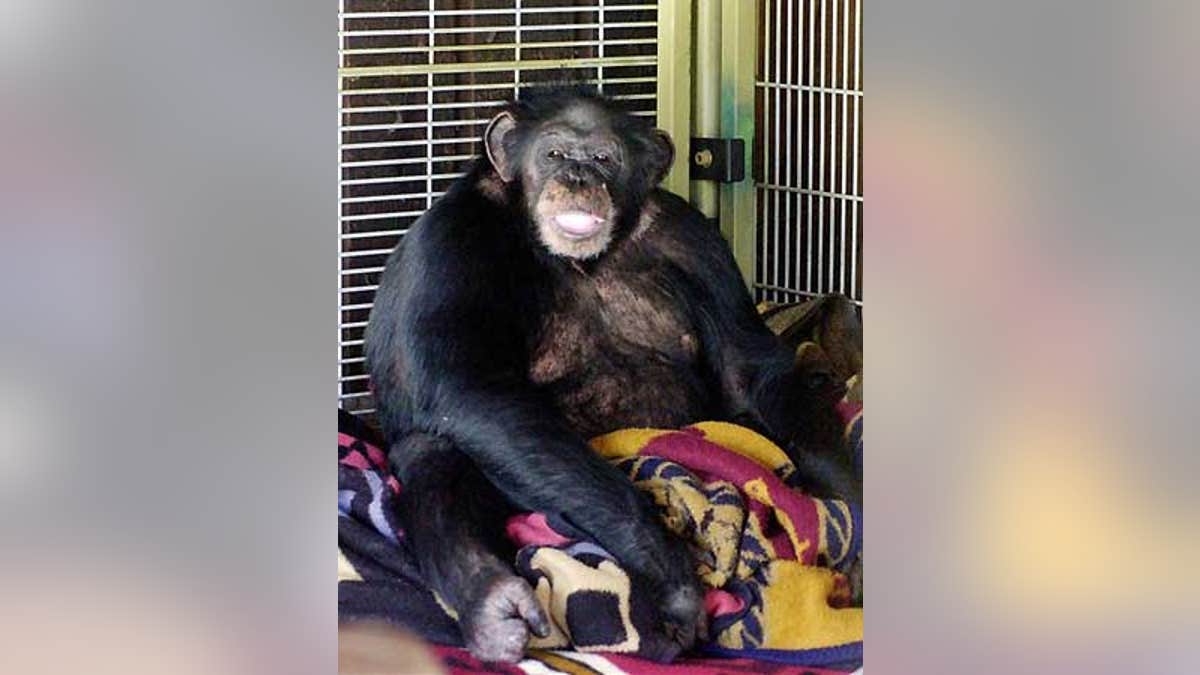
Travis the chimpanzee, pictured here in a 2003 file photo (AP)
A bill pending in Congress that would ban selling primates as pets must be passed to rectify a patchwork of state and local laws that leave many people at risk of being attacked by exotic animals like chimpanzees, animal experts and lawmakers told FOXNews.com.
Police shot and killed a 200-pound chimpanzee in Connecticut Monday after it attacked a 55-year-old woman, leaving her in critical condition with major, "life-altering" injuries to her face and hands.
Police say Charla Nash was visiting the home of the primate's owner, 70-year-old Sandra Herold, when the chimp attacked. Herold saved her friend's life by stabbing the 14-year-old chimpanzee with a knife and bludgeoning him with a shovel. The chimp was eventually killed by a police officer who responded to a 911 call and shot the animal as it opened the door and entered his patrol car.
Click here to listen to the 911 call.
Herold says she loved her chimp, Travis, like a child, and she has reportedly called the incident a "freak thing." But animal experts say chimpanzees are enormously powerful primates that, though highly evolved, remain wild animals despite attempts to domesticate them.
"Travis is just one story out of many, and all of them end badly," Dr. Virginia Landau, vice president of The Jane Goodall Institute and director of its Chimpanzoo Program, told FOXNews.com.
"He wanted to be the boss. In the wild, he'd be working his way up the social ladder and be taking on females in the group to make them more submissive."
Landau estimated that up to 400 chimpanzees are kept as pets in the U.S. They have "dagger-like" canine teeth, Landau said, and any attack can prove fatal. And at 200 pounds — well above the average weight of an adult male chimpanzee in the wild — Travis was likely very imposing.
"It's a weapon in the wild," Landau said of the animal's large canine teeth. "It's a nasty hurt and they have a special jaw set up to allow their teeth to rip into flesh. It's not something you want to be on the receiving end of."
Following Monday's attack, which Herold reportedly called "horrific," two U.S. congressmen — Earl Blumenauer, D-Ore., and Mark Kirk, R-Ill. — and The Humane Society of the United States renewed calls for the passage of the Captive Primate Safety Act. If passed, the bill would make it illegal to buy or transport a pet primate across state lines.
The measure — introduced in 2005 two weeks after a man was mauled by two chimpanzees in California — passed the House of Representatives in June by a vote of 302 to 96. It also passed a Senate committee, but it was not enacted before Congress adjourned. Sens. Barbara Boxer, D-Calif., and David Vitter, R-La., who introduced a Senate version of the bill, did not immediately return requests for comment Wednesday.
"The tragedy that took place in Connecticut definitely highlights the problem of people keeping primates as pets and will hopefully spur calls at the federal level for action," said Beth Preiss, director of the Humane Society's Exotic Pets Campaign. "There's a real need for action."
Preiss said the bill has stalled in Congress, apparently due to a lack of visibility on the issue.
"There are other priorities," she said. "But if people thought this wasn’t a real problem, they'll see it is a real problem and hopefully it'll lead to swift passage of the legislation."
The crux of the problem, Preiss said, is the "patchwork" of state and local laws concerning primates kept as pets. In Connecticut, primates are allowed with a state permit. Other states, including Missouri, Ohio, North Carolina, West Virginia, Wisconsin and Oklahoma, do not have statewide restrictions on raising primates as pets.
"They're wide open for any exotic pet; you could have a tiger," Preiss said.
Twenty states and the District of Columbia ban keeping primates as pets, but others, including Michigan, Illinois and Virginia, prohibit some exotic animals but allow primates.
"We think primates belong on that list," Preiss said.
Landau added, "But as along as people can go in and out of states, they're going to do it."
Police say they are considering filing criminal charges against Herold. A pet owner can be held criminally responsible for an attack if he or she knew or should have known that an animal was a danger to others. Police said the chimpanzee was agitated earlier in the day of the attack and was given an anti-anxiety drug that had not been prescribed. Travis also had Lyme disease, a tick-borne illness that can lead to arthritis and meningitis in humans.
Herold disputed those police reports on Wednesday, telling The Associated Press that she "never, ever" gave the animal the anti-anxiety drug Xanax.
Click here to watch the MyFOXNY interview with Sandra Herold.
Dave Salmoni, host of Animal Planet's "After the Attack," said the disease could have caused mild behavioral changes in the animal, but it's unlikely it led to the attack.
"You're generally going to see lots of conditions before you're going to see a crazy rampage," he said. "The diseases would have to be pretty heavily set in for it to actually cause that drastic of a change."
With or without a condition like Lyme disease, Salmoni said chimpanzees are among the most dangerous animals to interact with and should be treated as such. Salmoni, who survived a lion attack in 1998 while working at Bowmanville Zoological Park near Toronto, supports the passage of the Captive Primate Safety Act.
"If you have a captive chimp and you're going to interact with him the way that [Herold and Nash] were, it's not 'if,' it's 'when' — it will attack," Salmoni told FOXNews.com.
"If you interact with a chimpanzee like that for that long, it will eventually turn on you. There's no question."




















